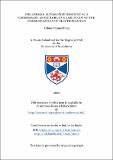Files in this item
The German automotive industry at a crossroads : an explorative case study of the communication of electrification
Item metadata
| dc.contributor.advisor | Hughes, Jeffrey | |
| dc.contributor.advisor | Woodfield, Ruth | |
| dc.contributor.author | Hein, Tobias | |
| dc.coverage.spatial | 310 p. | en_US |
| dc.date.accessioned | 2022-10-18T13:14:54Z | |
| dc.date.available | 2022-10-18T13:14:54Z | |
| dc.date.issued | 2022-11-30 | |
| dc.identifier.uri | https://hdl.handle.net/10023/26213 | |
| dc.description.abstract | The German automotive industry is facing the most challenging and demanding change in its 130-year history. It finds itself at a crossroads with an unknown future ahead. The renunciation of internal combustion engines and the pressure to replace them with emission-free electric engines poses an immense challenge to the entire industry. This thesis examines how electrification as a pro-environmental change is communicated and perceived, and how its communication differs from conventional change communication. An explorative case study structure was applied. It focuses on three automotive companies from South-West Germany, of which two are supplier companies, and one is an original equipment manufacturer. In total, 41 participants took part in semi-structured interviews. Secondary data in the form of publications issued by the government and automotive companies were additionally analysed. Moreover, observations at the study locations were undertaken to gain an understanding of how electrification as a change impacts the work environment of this thesis’ participants. This thesis found that the perceptions of electrification differ between automotive companies and are linked to the extent to which corporate cultures, business models, and individual beliefs support and facilitate pro-environmental actions. Moreover, an understanding of how German automotive companies attempt to communicate electrification was established. This thesis shows that companies discontinue their established change communication processes and replace them with new communication methods. In response to electrification, the case study companies created communication methods that they have never used before to communicate changes, showing the uniqueness of this pro-environmental change. This research is the very first academic contribution that explores automotive companies’ communicative responses to electrification and the perceptions towards electrification and its communication. Thus, this thesis aims to understand how automotive companies address electrification and how they utilise new communication methods in the pursuit of moving transportation into a new age. | en_US |
| dc.language.iso | en | en_US |
| dc.subject | Change | en_US |
| dc.subject | Electrification | en_US |
| dc.subject | Communication | en_US |
| dc.subject | Change-communication | en_US |
| dc.subject | Automotive | en_US |
| dc.subject | Germany | en_US |
| dc.subject | Change--Perceptions | en_US |
| dc.subject | Perceptions | en_US |
| dc.subject | Communication--Perceptions | en_US |
| dc.subject | E-mobility | en_US |
| dc.subject | Drivetrains | en_US |
| dc.subject | Explorative study | en_US |
| dc.subject | Pro-environmental | en_US |
| dc.subject | Pro-environmental behaviour | en_US |
| dc.title | The German automotive industry at a crossroads : an explorative case study of the communication of electrification | en_US |
| dc.type | Thesis | en_US |
| dc.type.qualificationlevel | Doctoral | en_US |
| dc.type.qualificationname | PhD Doctor of Philosophy | en_US |
| dc.publisher.institution | The University of St Andrews | en_US |
| dc.identifier.doi | https://doi.org/10.17630/sta/211 |
This item appears in the following Collection(s)
Items in the St Andrews Research Repository are protected by copyright, with all rights reserved, unless otherwise indicated.

